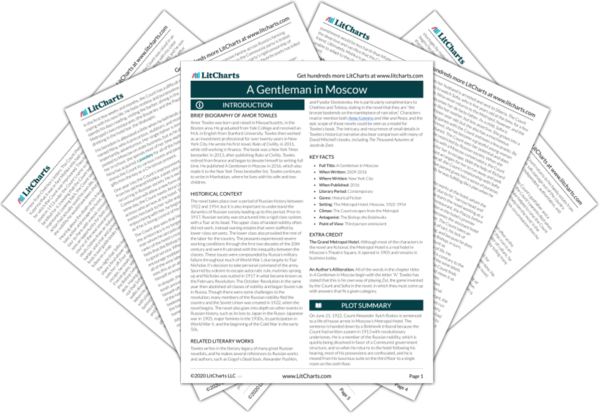Welcome to the LitCharts study guide on Amor Towles's A Gentleman in Moscow. Created by the original team behind SparkNotes, LitCharts are the world's best literature guides.
A Gentleman in Moscow: Introduction
A concise biography of Amor Towles plus historical and literary context for A Gentleman in Moscow.
A Gentleman in Moscow: Plot Summary
A quick-reference summary: A Gentleman in Moscow on a single page.
A Gentleman in Moscow: Detailed Summary & Analysis
In-depth summary and analysis of every chapter of A Gentleman in Moscow. Visual theme-tracking, too.
A Gentleman in Moscow: Themes
Explanations, analysis, and visualizations of A Gentleman in Moscow's themes.
A Gentleman in Moscow: Quotes
A Gentleman in Moscow's important quotes, sortable by theme, character, or chapter.
A Gentleman in Moscow: Characters
Description, analysis, and timelines for A Gentleman in Moscow's characters.
A Gentleman in Moscow: Terms
Description, analysis, and timelines for A Gentleman in Moscow's terms.
A Gentleman in Moscow: Symbols
Explanations of A Gentleman in Moscow's symbols, and tracking of where they appear.
A Gentleman in Moscow: Theme Wheel
An interactive data visualization of A Gentleman in Moscow's plot and themes.
Brief Biography of Amor Towles
Amor Towles was born and raised in Massachusetts, in the Boston area. He graduated from Yale College and received an M.A. in English from Stanford University. Towles then worked as an investment professional for over twenty years in New York City. He wrote his first novel, Rules of Civility, in 2011, while still working in finance. The book was a New York Times bestseller. In 2013, after publishing Rules of Civility, Towles retired from finance and began to devote himself to writing full time. He published A Gentleman in Moscow in 2016, which also made it to the New York Times bestseller list. Towles continues to write in Manhattan, where he lives with his wife and two children.
Get the entire A Gentleman in Moscow LitChart as a printable PDF.

Historical Context of A Gentleman in Moscow
The novel takes place over a period of Russian history between 1922 and 1954, but it is also important to understand the dynamics of Russian society leading up to this period. Prior to 1917, Russian society was structured into a rigid class system, with a Tsar at its head. The upper class of landed nobility often did not work, instead owning estates that were staffed by lower-class servants. The lower class also provided the rest of the labor for the country. The peasants experienced severe working conditions through the first two decades of the 20th century and were frustrated with the inequality between the classes. These issues were compounded by Russia’s military failure throughout much of World War I, due largely to Tsar Nicholas II’s decision to take personal command of the army. Spurred by a desire to escape autocratic rule, mutinies sprang up and Nicholas was ousted in 1917 in what became known as the February Revolution. The October Revolution in the same year then abolished all classes of nobility and began Soviet rule in Russia. Though there were some challenges to the revolution, many members of the Russian nobility fled the country and the Soviet Union was created in 1922, when the novel begins. The novel also goes into depth on other events in Russian history, such as its loss to Japan in the Russo-Japanese war in 1905, major famines in the 1930s, its participation in World War II, and the beginning of the Cold War in the early 50s.
Other Books Related to A Gentleman in Moscow
Towles writes in the literary legacy of many great Russian novelists, and he makes several references to Russian works and authors, such as Gogol’s Dead Souls, Alexander Pushkin, and Fyodor Dostoevsky. He is particularly complimentary to Chekhov and Tolstoy, stating in the novel that they are “the bronze bookends on the mantlepiece of narrative.” Characters read or mention both Anna Karenina and War and Peace, and the epic scope of those novels could be seen as a model for Towles’s book. The intricacy and recurrence of small details in Towles’s historical narrative also bear comparison with many of David Mitchell’s books, including The Thousand Autumns of Jacob de Zoet.
Key Facts about A Gentleman in Moscow
- Full Title: A Gentleman in Moscow
- When Written: 2009-2016
- Where Written: New York City
- When Published: 2016
- Literary Period: Contemporary
- Genre: Historical Fiction
- Setting: The Metropol Hotel, Moscow, 1922-1954
- Climax: The Count escapes from the Metropol
- Antagonist: The Bishop; the Bolsheviks
- Point of View: Third person omniscient
Extra Credit for A Gentleman in Moscow
The Grand Metropol Hotel. Although most of the characters in the novel are fictional, the Metropol Hotel is a real hotel in Moscow’s Theatre Square. It opened in 1905 and remains in business today.
An Author’s Alliteration. All of the words in the chapter titles in A Gentleman in Moscow begin with the letter “A.” Towles has stated that this is his own way of playing Zut, the game invented by the Count and Sofia in the novel, in which they must come up with answers that fit a given category.












